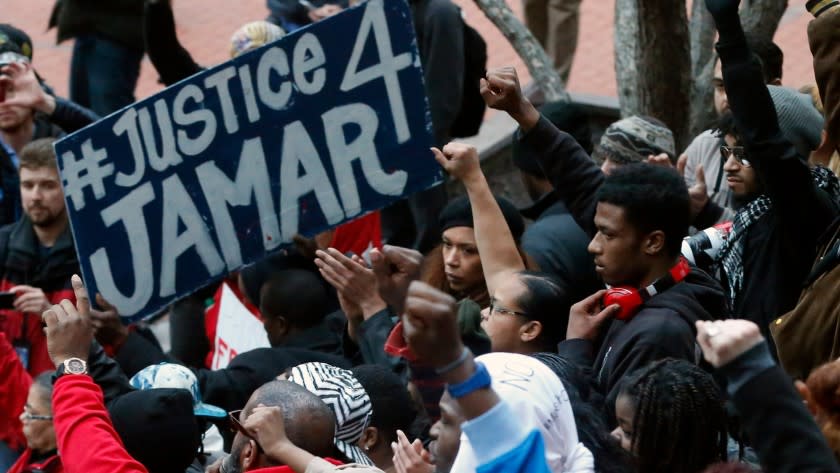Editorial: Protesting injustice is your sacred right as an American

Congress shall make no law abridging the freedom of speech or the rights of the people to peaceably assemble or "to petition the government for a redress of grievances." These crucial 1st Amendment protections also limit state government action, thanks to the 14th Amendment, and embody essential values that created and have sustained this nation: People can, should and will protest against perceived injustice.
That’s a principle with special resonance today, as the nation witnesses angry protests over the police killing of George Floyd in Minneapolis and similar injustices directed at African Americans and others relegated to second-class status in our society. The demonstrations come amid a movement by state lawmakers to falsely equate lawful protest and civil disobedience with crime and terrorism. These chilling moves against fundamental liberties must not stand.
A May report from PEN America, an organization dedicated to literature, human rights and free expression, documents 82 state bills considered or adopted by 32 states to criminalize assembly and speech. One of the offending states, as it happens, is Minnesota. Lawmakers there appear motivated by environmental protests in neighboring North Dakota and Black Lives Matter protests in their own state.
One such instance followed the police killing of a young African American man named Jamar Clark in November 2015. Turned back from a planned protest at a shopping mall, demonstrators temporarily disrupted traffic at the Minneapolis–St. Paul International Airport.
Minnesota lawmakers responded with a bill to punish traffic obstruction with up to a year in prison — an astonishingly excessive term far out of proportion to the offense. Blocking traffic is of course already prohibited in Minnesota and elsewhere, and protesters who march onto airport roads or freeways can expect to face legal consequences. But it is a nonviolent act of civil disobedience, and the temporary inconvenience it poses to drivers does not warrant the kind of penalty generally reserved for serious criminals. According to PEN, the bill’s sponsor, Rep. Nick Zerwas, acknowledged that the purpose was dissuade potential protesters. The measure was passed but vetoed by the governor.
A separate Minnesota bill to criminalize protests against “critical infrastructure” was inspired by the 2016 demonstrations against the Dakota Access Pipeline through the Standing Rock Indian Reservation in North Dakota. So-called critical infrastructure bills in other states penalize protests on or near railroad tracks or telephone poles. A Kentucky bill carries a sentence of up to five years. Those proposals stalled.
“Under such statutes,” PEN reports, “a protester who merely crosses onto land hosting a pipeline could be held criminally liable.”
One of the more chilling provisions of anti-protest laws considered in several states would impose criminal liability for property damage caused by others participating in the same action. A person joining a protest but causing no damage could be held liable for up to $1 million for damage caused by others.
Other bills give police greater leeway to characterize protests as “riots” and to charge peaceful protesters with rioting because of the actions of others in their presence. A New Jersey bill, if passed, would have imposed up to five years in prison for participating in a protest in which any other person caused damage of more than $2,000.
That would have categorized protesters against the brutal killing of George Floyd as rioters, not because of any act they committed, but because they expressed their dissent at the same time or in the same place as violent lawbreakers.
“One person’s decision to resort to violence does not strip other protesters of their right to freedom of peaceful assembly,” as PEN quotes United Nations special rapporteurs for freedom of expression and assembly. “This right is not a collective right; it is held by each of us individually.”
Other proposals seek to turn protesters into terrorists. A North Carolina bill, for example, would create the crime of “economic terrorism” and permits prosecution against any person who has committed obstruction with the intention to influence government action.
In other words, an act of temporary civil disobedience would be an act of terrorism. Such a law would make Susan B. Anthony a terrorist for pushing a ballot into a ballot box. It would make other American heroes terrorists for taking a seat on a bus or at a lunch counter, walking across a bridge, stopping work or doing any of the other things that have won Americans some of their most cherished rights and liberties. Watch out for attempts to intimidate people who would protest the gap between what we know to be legal and what we know to be just.

